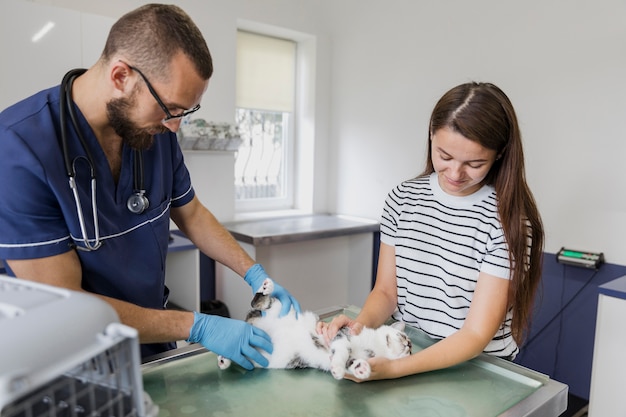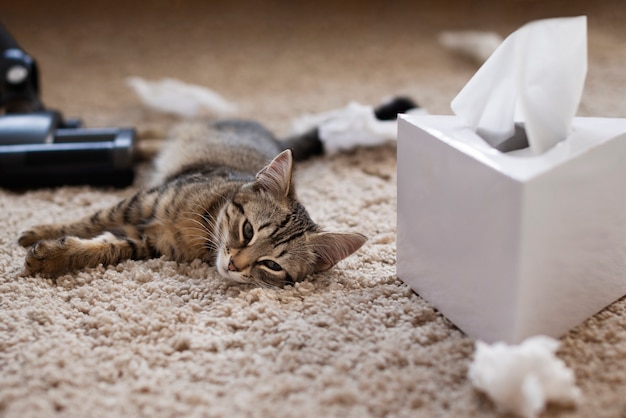Understanding Laceration Repair Surgery in Urgent Pet Care

Understanding Laceration Repair Surgery in Urgent Pet Care
When your pet suffers a sudden cut or wound, it can be alarming and stressful. Whether your dog snags their paw on sharp debris during a walk, or your cat is injured in a household mishap, pet wounds require swift and expert attention to prevent complications. At VetCheck Pet Urgent Care Center - Wesley Chapel, our veterinary team understands how urgent these situations can feel, especially if you are searching for immediate answers like "emergency vet near me" or "pet wound care in Wesley Chapel." Our urgent care clinic, located at 4424 Friendly Way Suite #130, Wesley Chapel, FL 33543, specializes in laceration repair surgery and comprehensive pet wound care, providing timely solutions when your family veterinarian is unavailable or when injuries simply can’t wait.
In this blog, we will walk you through how to recognize serious wounds in pets, why lacerations happen, what to expect during laceration repair surgery, and why prompt attention leads to better healing. We’ll also share practical aftercare tips and explain when it’s time to seek emergency veterinary care. At VetCheck Pet Urgent Care Center - Wesley Chapel, walk-ins are always welcome; no appointment is needed, so you can count on immediate care when emergencies strike. For those needing more details about our laceration repair surgery services, our team is here to support you every step of the way.
Recognizing When Your Pet Needs Laceration Repair Surgery
Key Signs Your Pet Has a Serious Wound
It’s not always easy to judge how severe a wound is just by looking at it, but certain symptoms indicate your pet may need urgent laceration repair surgery. Common signs that warrant immediate attention include persistent bleeding that doesn’t stop within a few minutes, visible muscle, fat, or bone beneath the skin, wounds longer than half an inch, or cuts with jagged or gaping edges. Additionally, if your pet’s wound is contaminated with dirt, debris, or appears swollen and red, infection may already be setting in. Other warning signs are your pet licking or pawing at the wound, limping, or showing signs of pain such as whining, hiding, or refusing to move.
In Wesley Chapel and surrounding communities, pet owners often encounter these emergencies after outdoor play, roughhousing, or even minor household accidents. If you notice any of these symptoms, it’s vital to seek prompt veterinary care. Our emergency veterinary care team is trained to evaluate wounds quickly and recommend the best course of action for your pet’s comfort and safety.
Subtle Symptoms That Shouldn’t Be Ignored
Some wounds may not bleed heavily or look dramatic but can still be serious. Puncture wounds from animal bites, for example, often close over quickly but trap bacteria inside, leading to abscesses or severe infections. Signs of infection after a wound include heat at the site, pus or discharge, a foul smell, or sudden changes in your pet’s behavior such as lethargy or loss of appetite. Even if a cut seems minor, it is always safer to have it checked by an urgent care vet near you, especially if your pet is at risk for infection or the wound is in a sensitive area like the face, paws, or abdomen.
Why Lacerations Happen: Common Causes and Risk Factors
Everyday Causes of Pet Lacerations
Lacerations, which are tears or deep cuts in the skin and underlying tissues, can happen to any pet. In the Wesley Chapel area, active dogs and curious cats often sustain wounds during outdoor adventures, encounters with wildlife, or interactions with other pets. Common scenarios leading to lacerations include stepping on broken glass, getting caught on fencing or sharp branches, or altercations with other animals. Inside the home, accidents involving sharp furniture edges, kitchen utensils, or even grooming tools can also result in wounds needing laceration repair surgery.
Hidden Dangers and Local Risks
Florida’s warm climate encourages year-round outdoor activity, which increases the likelihood of pets encountering hazards like thorny plants, loose wires, or debris after a storm. Additionally, the presence of wildlife in local parks and neighborhoods can lead to unexpected bites or scratches. Owners of senior pets or those with medical conditions should be especially vigilant, as these animals may have thinner skin and slower healing, making even small wounds a cause for concern.
The Laceration Repair Surgery Process: What Pet Owners Can Expect
How Our Veterinary Team Assesses and Treats Pet Wounds
When you arrive at our urgent care clinic for pet wound care in Wesley Chapel, our veterinary professionals begin by thoroughly assessing the injury. The process starts with an exam to determine the depth, size, and location of the wound, as well as checking for foreign objects or signs of infection. Our on-site in-house diagnostics may be used if there’s concern about underlying damage or if your pet is showing signs of shock, such as pale gums, rapid breathing, or weakness.
If laceration repair surgery is needed, the area is carefully cleaned and disinfected to minimize infection risk. Depending on the injury, your pet may need sedation or anesthesia for pain control and to keep them still during the procedure. The wound edges are then trimmed to remove damaged tissue, which helps promote healthy healing. Our veterinary team will suture or staple the wound closed, sometimes placing drains if there is a risk of fluid buildup. After closing the wound, the area is bandaged, and your pet is monitored as they recover.
Advanced Techniques and Supportive Care
Our urgent care clinic is equipped with advanced tools and technology to ensure optimal outcomes for laceration repair surgery in Wesley Chapel. We provide intravenous fluids, pain relief, and antibiotics as needed to support healing and reduce the risk of complications. For larger or more complex wounds, our expertise in pet soft tissue surgery ensures your pet receives comprehensive care on the spot. Before discharge, we go over home care instructions, including how to keep the wound clean, when to return for suture removal, and what signs of infection to watch for.
Supporting Healing at Home: Pet Wound Care Tips
Essential Steps for Home Care After Surgery
Proper home care after laceration repair surgery plays a crucial role in your pet’s recovery. Preventing your pet from licking, chewing, or scratching at the wound is essential; many pets will need to wear an Elizabethan collar or a similar device. Keep the wound clean and dry according to your veterinarian’s instructions, and check the area daily for swelling, redness, or discharge. Administer any prescribed medications exactly as directed, and ensure your pet avoids vigorous activity or rough play until healed. If your pet’s wound was bandaged, follow guidelines for changing dressings and monitor for any unpleasant odor or moisture under the bandage.
When to Contact Your Veterinarian
Even with the best home care, some pets may develop complications. Contact our urgent care clinic immediately if you notice new bleeding, increased swelling, pus, separation of the wound edges, or if your pet seems unusually tired or loses interest in food. Our veterinary professionals are available during extended hours to provide guidance and hands-on support, making us a reliable option when you’re searching for “urgent care vet near me” or “pet wound care near me” in the Wesley Chapel region.
When to Seek Immediate Veterinary Care for Your Pet’s Wound
Understanding When It’s an Emergency
Not every cut or scrape will require laceration repair surgery, but hesitation can lead to infection, delayed healing, or even life-threatening complications. You should bring your pet for emergency veterinary care if bleeding is profuse or cannot be stopped with gentle pressure, if the wound is deep or exposes underlying structures, if the injury results from a bite or unknown animal, or if your pet’s overall health suddenly declines. Pets with chronic illnesses, those on certain medications, or senior animals are especially vulnerable and should be seen without delay for any new wound.
At VetCheck Pet Urgent Care Center - Wesley Chapel, no appointment is needed and walk-ins are always welcome. Our team is here to provide emergency and urgent care when your primary veterinarian is unavailable, including evening and weekend hours. Trusting your instincts and seeking timely help can make all the difference in your pet’s recovery and comfort.
The Importance of Prompt Laceration Repair Surgery in Wesley Chapel
The sooner a serious wound is assessed and treated, the better the outcome for your pet. Prompt laceration repair surgery in Wesley Chapel helps minimize scarring, reduces infection risk, and gets your pet back on their paws faster. Our veterinary team is committed to delivering immediate, compassionate care at every stage of the healing process, from wound assessment through recovery.
Compassionate Urgent Pet Wound Care in Wesley Chapel: Your Next Steps
When your pet faces a sudden injury, you want answers and expert care fast. At VetCheck Pet Urgent Care Center - Wesley Chapel, our veterinary professionals treat every pet as if they were our own, providing advanced laceration repair surgery and pet wound care when your regular vet isn't available. We welcome walk-ins—no appointment is ever needed—so you can bring your pet directly to our Wesley Chapel location for immediate support.
If you are searching for an emergency vet near me or need trusted pet wound care in Wesley Chapel and surrounding communities, our doors are open for you and your pet. For more details about our approach to laceration repair surgery or to learn about our full spectrum of emergency and urgent care services, reach out to our veterinary team or simply stop by. Your pet’s comfort and health are our priority, every day of the week.
For immediate assistance, call (813) 365-7004 or visit us at 4424 Friendly Way Suite #130, Wesley Chapel, FL 33543. Walk-ins are welcome whenever you need urgent pet care.
This blog is intended for informational purposes only. If your pet is experiencing an emergency, always seek immediate veterinary care. Only a professional examination can determine the best treatment for your pet’s specific needs. For more information on laceration repair surgery, see this veterinary surgical reference.


















